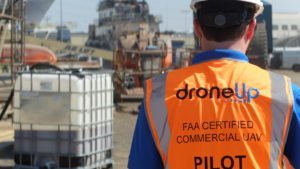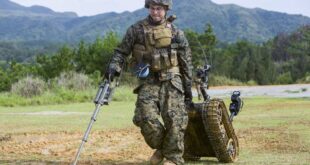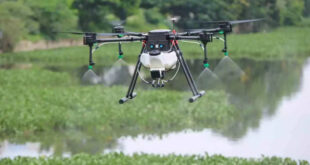Drone services company DroneUp has been approved for an industry-first FAA Waiver for flight over people and moving vehicles to support drone delivery of COVID-19 test kits anywhere in the U.S.
Scaling drone delivery throughout the country will require flight over people and moving vehicles, something that U.S. drone regulations currently prohibit without a waiver. Now, DroneUp, LLC announces that it has been approved “for the Federal Aviation Administrations (FAA) Section 107.39 Operation Over People Waiver allowing the unrestricted flight over non-participating persons and moving vehicles to support the drone delivery of COVID-19 test kits,” according to a press release.
“DroneUp’s 107.39 waiver is the first to allow drone delivery operations over people anywhere in the United States without predefined operating areas, locations, or routes. The waiver is also a first to allow unrestricted delivery overflight of moving vehicles.”
Brendan Stewart, DroneUp Training and Compliance Director, says that the ground-breaking waiver required time, collaboration, and a compelling application. “We had to approach this waiver with a strong spirit of collaboration with the FAA, and a willingness to do additional homework to validate our safety case,” says Stewart. “We came to the table with the safety and standardization infrastructure that you’d expect from a small airline… Operating manuals, a safety management system, practical flight tests and proficiency checks, standardized operational risk management and flight reporting.”
“Those components were hugely important to articulate to the [FAA] why they should entrust DroneUp with a first-of-its-kind approval,” Stewart says. “We also worked closely with Indemnis who provided the airframe parachute, the core mitigating technology to support our application.”
The waiver is a big deal for drone delivery. DroneUp has emerged as a significant player in the delivery sector, partnering with retail giant Walmart and the world’s largest package delivery service, UPS. DroneUp was also instrumental in defining what can be accomplished with drone delivery under the FAA’s Part 107 rule. This waiver is another major step forward: DroneUp CEO Tom Walker’s signature message of “get it done now” comes across loud and clear in an operation which puts together industry-standard DJI drones, a commercially available parachute system from Alaskan-based Indemnis, and a daylight waiver which will allow delivery operations 24 hours a day.
With the 107.39 waiver, DroneUp will be able to scale their project of delivering COVID-19 test kits to residential homes by drone, a contactless delivery system singularly well-suited to meet the needs of pandemic-struck communities. They don’t plan to stop there, however.
“The impetus for developing this waiver was the need to scale our delivery operations under Part 107 in markets where flight over people and moving vehicles can’t feasibly be avoided: flying in congested urban areas, or on-demand flights to deliver to individual residences in suburban areas,” says Stewart. “This concept of operations is directly applicable to other operations where people and vehicles can’t be controlled, including building inspections for big box stores. The driving need for this waiver may have been COVID kit deliveries, but it’s certainly not limited to those operations.”
Getting the first waiver is difficult: subsequent applications, however, will be able to build upon DroneUp’s work. As more companies receive waivers to fly over people and vehicles, the industry may finally be able to move drone delivery from test case scenario in controlled areas to more mainstream use in a wide variety of environments.
“Much of the language in Part 107 came from precedent set by the Section 333 approvals that came before them. Many of the waivers you see being approved today incorporate shared best practices from similar operations,” Stewart says. “This waiver demonstrates a safety standard and sets a precedent. We’ve proven that if a drone can safely fly over people, it can be configured to safely fly over moving vehicles as well. We’ve proven that if we can safely carry a camera over people and moving vehicles, we should be able to carry other payloads, as well.”
“Looking back, those early 333 approvals set the precedent for what are mainstream operations today,” Stewart says. “We hope that this waiver approval will continue that trajectory into the future.”
Miriam McNabb is the Editor-in-Chief of DRONELIFE and CEO of JobForDrones, a professional drone services marketplace, and a fascinated observer of the emerging drone industry and the regulatory environment for drones. Miriam has penned over 3,000 articles focused on the commercial drone space and is an international speaker and recognized figure in the industry. Miriam has a degree from the University of Chicago and over 20 years of experience in high tech sales and marketing for new technologies.
For drone industry consulting or writing, Email Miriam.
TWITTER:@spaldingbarker
Subscribe to DroneLife here.
https://dronelife.com/2020/12/07/droneups-waiver-for-flight-over-people-is-a-major-step-for-drone-delivery/
 Unmanned Aerial Vehicle The latest drone news
Unmanned Aerial Vehicle The latest drone news




